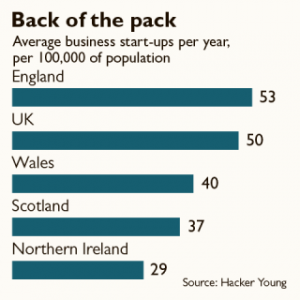Start-ups slowed down by uncertainty
- August 10, 2017
- Jack Cunningham
- 0 Comments

Political uncertainty caused by both the independence and the Brexit votes has hindered Scotland’s business birth rate, one of the country’s leading accountancy firms has claimed.
The comments, by Colin Jones, a partner at UHY Hacker Young, followed the publication of figures showing that Scotland has one of the worst business start-up rates in the UK.
Statistics compiled by the firm found that Scotland’s business start-up rate of 37 per 100,000 people was lower than Wales and far behind England.
Only Northern Ireland, where there is a business start-up rate of 29 per 100,000 of population, fares worse.
The rate in Wales is 40 while in England it is 53 per 100,000 — almost 50 per cent better than in Scotland.
The accountants also analysed the start-up rate for individual local authority areas and found that the problem of poor business innovation was not confined to Scotland, but was shared around the Celtic fringe of the UK.
They discovered that 18 of the bottom 20 areas for business births were in Scotland, Wales or Northern Ireland.
Three Scottish areas made this bottom 20: Dumfries and Galloway with a business start-up rate of only 26 per 100,000 of population and Orkney and North Ayrshire, both of which have a start-up rate of 28.
The areas at the bottom of the list are all in Wales. Torfaen was found to have a start-up rate of 20, Ceredigion a rate of 19 and the Vale of Glamorgan languishing in last place with a business birth rate of only 16 per 100,000 people.
The accountants said that recent political uncertainty, combined with a lack of governmental help and encouragement, was behind the low figures for Wales, Scotland and Northern Ireland.
Mr Jones said: “Uncertainty, given the Scottish referendum and then the Brexit referendum, will have been key factors hindering the creation of new businesses. Creating a new business is a high-risk decision, and entrepreneurs need an environment and business framework that is stable, encouraging and predictable.”
He added: “The Celtic fringe needs support in order to encourage new business growth — the potential in these areas needs to be properly harnessed. Areas in the ‘Northern Powerhouse’ receive significant investment from the UK government in support for new businesses, and now the same needs to happen in Wales, Northern Ireland and Scotland.
“It is important that any future investment by the UK government into new business creation is evenly spread throughout the country, rather than just a few select areas.”
Dean Lockhart, the economy spokesman for the Scottish Conservatives, also called on ministers to do more.
He said: “It is disappointing to see yet more figures showing that Scotland is lagging behind the rest of the UK.
“New business start-ups are in many ways the lifeblood of a nation’s economy. The Scottish Conservatives have encouraged the SNP government to do more in this area for several years now.
“There are real strengths in our economy, and there are some areas that are performing far better than others when it comes to start-ups. But this type of survey shows there is still a great deal of work to be done to ensure the whole of our economy across the whole country can grow.”
Keith Brown, Scotland’s economy secretary, defended the Scottish government’s record, pointing out that the number of registered business births increased by 2.3 per cent between 2014 and 2015.

